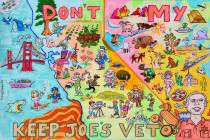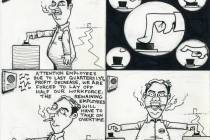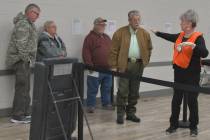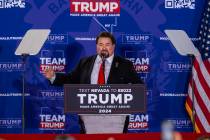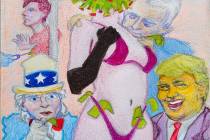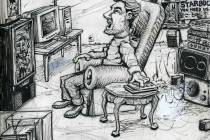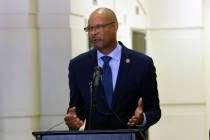Judges and police aren’t all-powerful
In August 1990, I was covering a court case at the Douglas County Courthouse. Walking past the law library, I noticed the defendant and his lawyer through a glass wall. I swung my camera up and shot some footage of them and then continued on my way.
Unbeknownst to me, the lawyer then went back into the courtroom and told Judge Norman Robison that the footage breached attorney/client communication, which was untrue (the glass wall blocked all sound). The lawyer also neglected to tell the judge that his client had made an obscene gesture at the camera.
Robison, without inquiring into the facts, called me into the courtroom and ordered me not to broadcast the footage.
The next morning, after he read the case law on prior restraint, Robison revoked the order. However, he had managed for the better part of a day to suspend the First Amendment by rushing into an order without checking on what his authority was.
After the police rioted in Chicago in 1968, Attorney General Ramsey Clark questioned who will uphold the law if not the police? The same question should be extended to judges. Police and judges often assume their authority without doing their homework.
The law on people taking photos is pretty clear. In an American Civil Liberties Union guide for people who like to take photos, it reads, “Taking photographs of things that are plainly visible from public spaces is a constitutional right – and that includes federal buildings, transportation facilities, and police and other government officials carrying out their duties.
Unfortunately, there is a widespread, continuing pattern of law enforcement officers ordering people to stop taking photographs from public places, and harassing, detaining and arresting those who fail to comply.”
Police officers sometimes confiscate cameras, virtually always being forced to return them. Interfering with officials doing their duties, of course, is not allowable. But taking photos that might embarrass officialdom doesn’t trigger any proscription against photography. This isn’t so much a problem for journalists as it is, in this time of camera phones, for ordinary people who might take the next Rodney King video.
The law on preventing the publication or broadcast of newsworthy material is also clear. U.S. Supreme Court rulings say nothing can stop it except urgent national emergency issues. A client making an obscene gesture doesn’t qualify. Nevertheless, when judges exceed their authority, their fellow judges are quick to cover for them. In 1990, after a local federal judge ordered CNN not to broadcast tapes made by the federal government of former Panamanian leader Manuel Noriega while he conferred with his lawyer during his criminal trial. CNN aired the tapes anyway.
The judge’s order was illegal, as was the government’s taping of the confidential client/lawyer meetings, and CNN’s action was legal under existing case law. But the U.S. Supreme Court decided the issue was not legality but a judge’s order. It upheld contempt against CNN.
During the Republican primary election campaign this year for a Nevada Senate seat representing north Carson City and southern Washoe County, a candidate named Gary Schmidt ran some television ads against his opponent, Ben Kieckhefer. Kieckhefer went to court and asked Judge Patrick Flanagan to order Schmidt to take the ads off the air. Flanagan looked at the facts issued the order Kiechhefer requested.. He had suspended the First Amendment.
The law on candidate television commercials is well established. If a candidate lies in his commercials, it is the job of voters to punish him, not the job of government to stop the commercials, and broadcasting stations are not allowed to refused commercials (unless they refuse ALL candidate commercials) or change or censor them.
For example, in Minnesota in 1990, a Republican candidate named Tad Jude ran an emotionally loaded TV spot dealing with a rape case that attacked his Democratic opponent. Information in the ad was false. But no informed judge could order Jude to stop running the ad.
Flanagan got away with his stunt, because he took action only days before the primary. But as the Mesquite News observed, “The judge is stealing information from the voters and usurping their right to determine the outcome of the election.”
This is the United States. In political speech, it is not for government to decide what is true and what is false and prevent us from hearing what it considers false. Members of the public get to hear it all, and decide for themselves what is true.
Dennis Myers is an award winning journalist who has reported on Nevada’s capital, government and politics for several decades. He has also served as Nevada’s chief deputy secretary of state.







